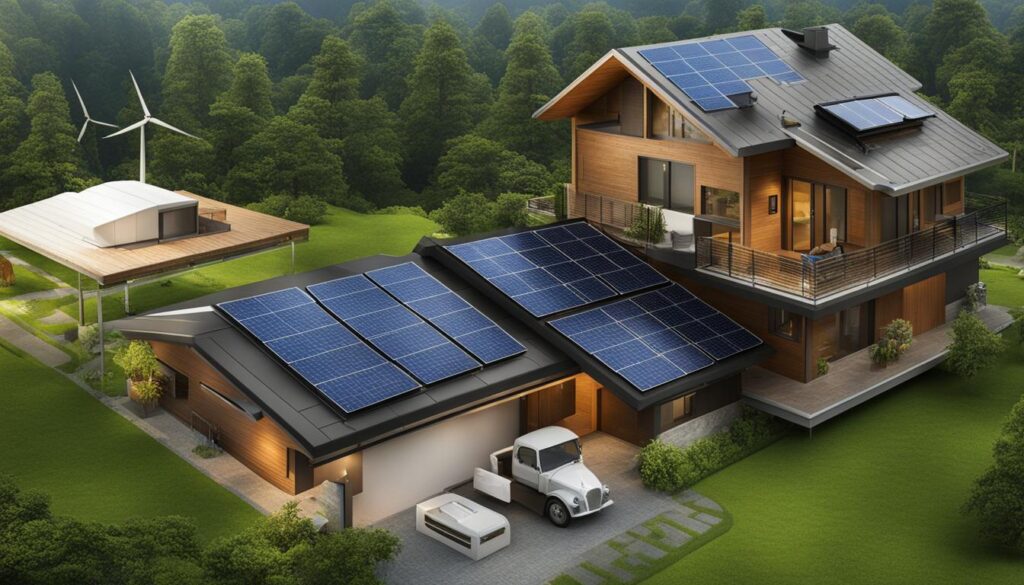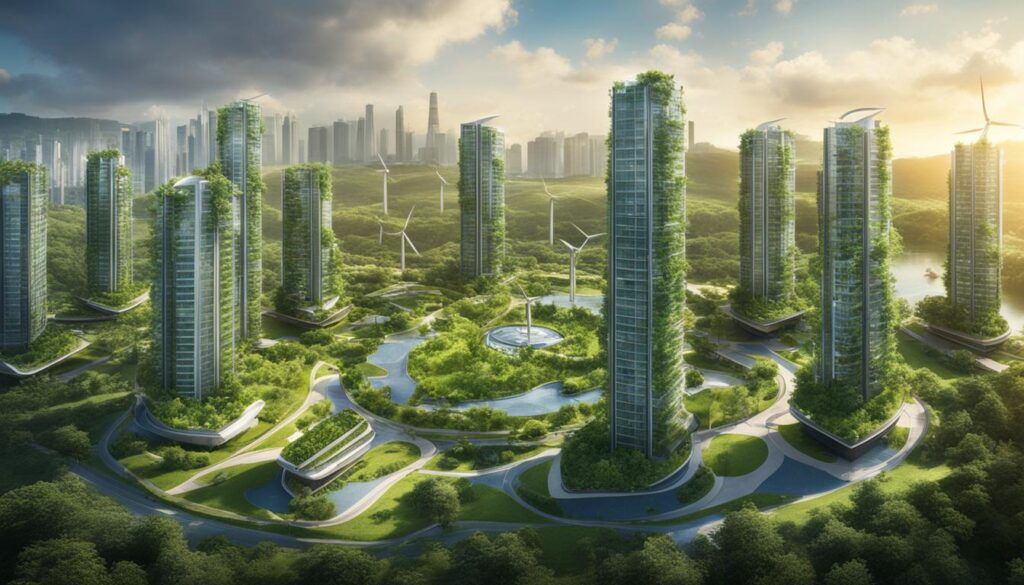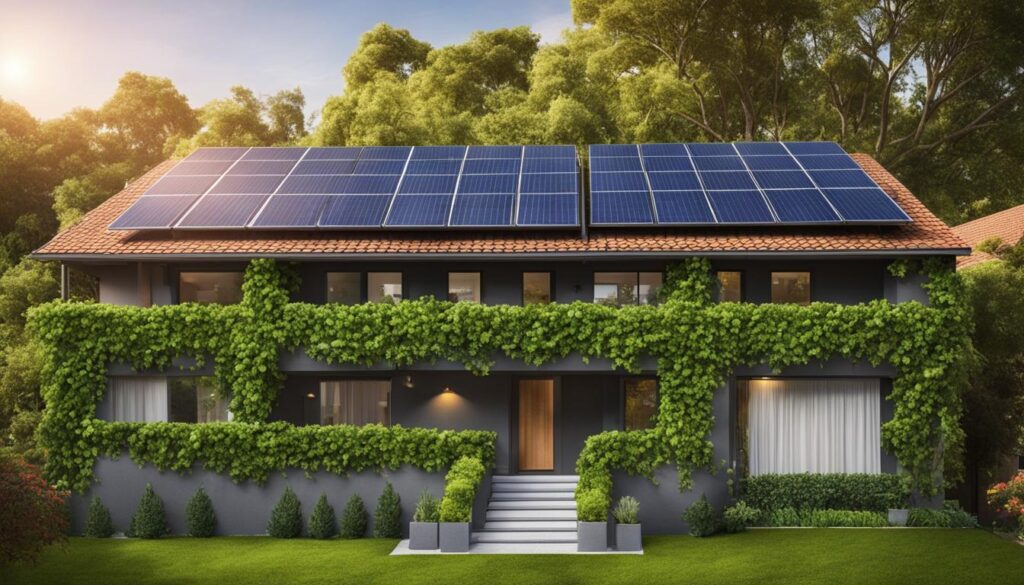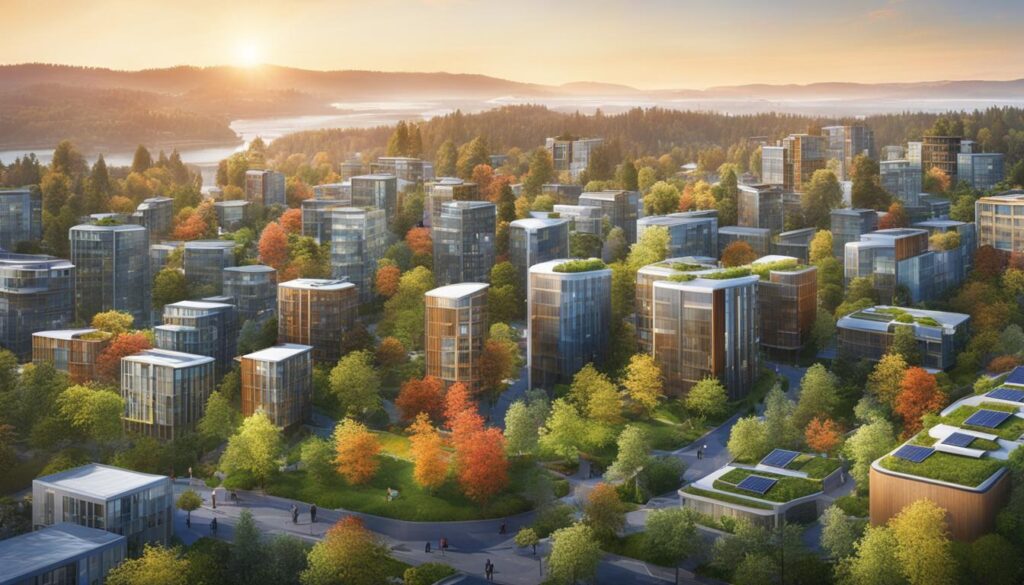In Victoria, we are no strangers to the effects of climate change. Rising temperatures, increasingly erratic weather patterns, and the visible impacts on our natural environment are evidence of the need for urgent action. As individuals, communities, and businesses, it’s our responsibility to embrace energy efficiency practices that help reduce our carbon footprint and promote sustainable living.
Energy conservation is a critical component of climate change mitigation. By implementing energy-efficient practices across various sectors, we can contribute to significant reductions in greenhouse gas emissions and promote resource sustainability. Implementing these practices will also help us save money on energy bills, reduce energy wastage, and create a healthier environment for all of us to live in.
Key Takeaways
- Energy efficiency is essential for reducing greenhouse gas emissions and promoting sustainable living in Victoria.
- Implementing energy-efficient practices leads to significant cost savings in energy bills and promotes resource sustainability.
- Conserving energy helps to create a healthier environment for future generations.
- By adopting energy-saving measures, we can reduce our carbon footprint and contribute to climate change mitigation.
- It’s the responsibility of individuals, communities, and businesses to prioritize energy efficiency and promote sustainable living practices in Victoria.
Benefits of Energy Efficiency
Implementing energy-efficient practices brings several benefits to Victoria’s climate. One of these is the construction of energy-efficient buildings. Not only do these buildings use less energy, but they also reduce costs for owners and tenants.
The utilization of renewable energy sources is also critical in reducing the carbon footprint of the Victoria region. By taking advantage of solar or wind energy, we can significantly reduce our reliance on non-renewable energy sources.
As a result of these measures, carbon footprint reduction is one of the most significant benefits. The reduction of carbon emissions mitigates the environmental impact of energy use. Such reduction can create a healthier environment for current and future generations.
In addition to these benefits, energy efficiency practices can bring about a more sustainable way of living in Victoria. By reducing energy consumption and preserving natural resources, we contribute to a healthier environment for ourselves and future generations.
Energy Conservation Measures
In order to promote energy efficiency and sustainable living practices, it is crucial that individuals and communities adopt practical energy conservation measures. We have compiled a list of energy-saving tips that can have a significant impact on reducing energy consumption.
1. Use Energy-Efficient Light Bulbs
Replacing traditional incandescent light bulbs with energy-efficient alternatives such as LED or CFL bulbs can significantly reduce energy consumption. These bulbs not only use less energy but also last longer, saving you money in the long run.
2. Unplug Appliances When Not in Use
Many appliances continue to consume energy when they are plugged in, even if they are not in use. Unplugging appliances such as televisions, computers, and chargers when they are not in use can help to reduce energy usage and save on your electricity bill.
3. Maintain Heating and Cooling Systems
Regular maintenance of heating and cooling systems can help to improve their efficiency and reduce energy consumption. This includes cleaning or replacing air filters, sealing air leaks, and adjusting thermostat settings to optimize energy usage.
“Replacing traditional incandescent light bulbs with energy-efficient alternatives such as LED or CFL bulbs can significantly reduce energy consumption.”
4. Choose Energy-Efficient Appliances
When purchasing appliances such as refrigerators, washing machines, and dishwashers, look for energy-efficient models. These appliances will typically have an Energy Star rating, indicating their energy efficiency and potential energy savings.
5. Reduce Water Usage
Reducing water usage in the home can also contribute to energy savings. Simple practices such as fixing leaky faucets, taking shorter showers, and using efficient washing machines and dishwashers can significantly reduce water and energy usage.
By adopting these energy-saving tips and emphasizing sustainable living practices, individuals and communities can work towards promoting energy efficiency and reducing their carbon footprint.

Environmental Impact of Energy Efficiency
Embracing energy-efficient practices can actively contribute to the sustainability of Victoria’s climate, reducing our negative environmental impact and creating a healthier future for generations to come. By incorporating energy-efficient technology, we can minimize our reliance on nonrenewable energy sources, mitigate the carbon footprint, and decrease the waste generated by unnecessary energy consumption.
To demonstrate how adopting energy-efficient practices can significantly impact the environment, we have created a table comparing the environmental impact of traditional vs. energy-efficient buildings in Victoria:
| Environmental Impact | Traditional Building | Energy-Efficient Building |
|---|---|---|
| Carbon Footprint | High | Low |
| Electricity Consumption | High | Low |
| Waste Generation | High | Low |
The data speaks for itself. Embracing energy-efficient practices can significantly reduce our environmental impact across all categories, promoting a sustainable lifestyle, and ensuring a viable future for everyone.
Government Initiatives and Programs
In Victoria, we have a range of government initiatives and programs aimed at promoting energy efficiency. These programs are designed to help individuals, businesses, and communities reduce their carbon footprint and contribute to climate change mitigation.
One of the most popular energy efficiency programs in Victoria is the Victorian Energy Upgrades program. The program offers incentives and discounts to individuals and businesses who upgrade to energy-efficient appliances and install energy-efficient technologies. By doing so, they can reduce their energy consumption and save on their energy bills.
Another notable initiative is the Smarter Resources, Smarter Business program, which provides businesses with the tools and resources they need to become more energy-efficient and sustainable. The program offers tailored advice, training, and funding to help businesses reduce their energy consumption and carbon footprint.

These government initiatives and programs play a crucial role in addressing climate change and promoting sustainable living in Victoria. The Victorian government has committed to reducing greenhouse gas emissions by 50% by 2030, and these programs are a key component in achieving this goal. By encouraging energy efficiency, we can create a healthier environment for future generations and build a more sustainable future for all.
The Role of Businesses in Energy Efficiency
Businesses play a vital role in driving energy efficiency in Victoria’s climate. By adopting energy-efficient practices, companies can reduce their environmental footprint while also saving money on energy costs. One significant way that businesses can contribute to energy efficiency is by constructing energy-efficient buildings.
Energy-efficient buildings are designed to use less energy than traditional buildings without compromising comfort or reliability. Incorporating features like high-efficiency insulation, LED lighting, and advanced HVAC systems can result in significant energy savings over time. Furthermore, businesses can also promote sustainable living among their employees by offering incentives for environmentally conscious behaviour, such as using public transport or biking to work.
Examples of Energy-Efficient Businesses in Victoria
| Company Name | Energy-Efficient Building Features |
|---|---|
| Coles Supermarkets | LED lighting, rooftop solar panels, and waste reduction strategies |
| NAB | Green Star-rated buildings, rainwater harvesting, and energy-efficient HVAC systems |
| Freshwater Creek Steiner School | Passive solar design, insulation made from recycled materials, and rainwater harvesting |
These businesses demonstrate the significant impact that energy-efficient buildings can have on reducing energy consumption and promoting sustainability. By implementing similar strategies, companies can contribute to a more environmentally friendly future while also reducing their long-term energy costs.
Overcoming Challenges in Implementing Energy Efficiency
Implementing energy efficiency measures can be a challenging endeavor, but it is a critical step towards conserving energy and promoting sustainable living in Victoria. Despite the numerous benefits that energy efficiency brings, several obstacles hinder its implementation.
1. Lack of Awareness
One of the significant challenges in achieving energy efficiency is the lack of awareness among individuals and communities. Many people are still unaware of the importance of conserving energy and promoting sustainable living practices. It is vital to educate people and increase awareness through public campaigns, workshops, and seminars.
2. High Implementation Costs
Another significant obstacle is the high implementation costs associated with energy-efficient practices. The cost of energy-efficient equipment, building materials, and renewable energy sources can be prohibitive for many people, especially in low-income areas. To overcome this challenge, incentives and rebates can be provided to encourage individuals and businesses to invest in energy-efficient products.
3. Resistance to Change
Resistance to change is a major obstacle in implementing energy-efficient practices in Victoria. For instance, some businesses may not be willing to adopt energy-efficient practices because of the perceived negative impact on their bottom line. It is crucial to emphasize the long-term benefits of energy efficiency, such as reduced energy costs and improved environmental sustainability.
4. Lack of Accessibility to Energy Conservation Measures
The inaccessible nature of energy conservation measures in Victoria is another challenge. For instance, some people may have limited access to energy-efficient buildings or renewable energy sources. To overcome this challenge, governments and private entities can invest in energy-efficient infrastructure and technologies in low-income areas.
Overcoming these obstacles requires a multi-pronged approach. Educating people about energy efficiency, providing incentives, emphasizing the long-term benefits, and investing in energy-efficient infrastructure and technologies can help achieve energy efficiency goals. By addressing these challenges, promoting energy conservation, and emphasizing the importance of sustainable living practices, we can foster a healthier environment in Victoria.

The Future of Energy Efficiency in Victoria’s Climate
As we move towards a more sustainable future, it’s essential to continue prioritising energy efficiency in Victoria’s climate. By reducing our carbon footprints and promoting sustainable living, we can work towards creating a healthier environment for future generations.
Investing in Renewable Energy Sources
One area with significant potential for reducing carbon emissions is renewable energy sources. By investing in wind, solar, and hydroelectric power, we can move towards cleaner energy production in Victoria. This investment provides an opportunity to create new, green jobs and address climate change by reducing greenhouse gas emissions.
Supporting Energy-Efficient Buildings
Another key area for reducing carbon footprints is through the construction of energy-efficient buildings. Energy-efficient buildings consume less energy and reduce long-term costs, making them an attractive proposition for investors. Furthermore, adopting green building practices also creates opportunities for local businesses and sustainable development.
Integrated Sustainable Planning
Integrated sustainable planning aims to address environmental, economic, and social issues together. In Victoria, prioritising this type of planning can be a way to create more sustainable communities. The approach aims to ensure that sustainable practices in areas such as water management, housing, and transport are integrated into community planning.
The Contribution of Everyone
While the government can help drive energy efficiency in Victoria, individuals also have a crucial role to play. Everyone can contribute to reducing carbon footprints and promoting sustainable living practices. This participation can include responsible energy consumption at home, supporting sustainable businesses in the local community, and improving waste management practices.
In conclusion, Victoria’s climate has enormous potential to reduce carbon footprints and promote sustainable living practices. Continued efforts towards investment in renewable energy sources, energy-efficient buildings, and integrated sustainable planning, coupled with individual contributions, can create a healthier environment for the generations to come.
Conclusion
In conclusion, we have discussed the importance of energy efficiency in Victoria’s climate and the various benefits that it brings. By implementing energy-saving measures, utilizing renewable energy sources, and reducing carbon footprints, we can contribute to a healthier environment and promote sustainable living in the region.
We have also explored the role of government initiatives and programs, as well as the crucial role that businesses play in driving energy efficiency. While there may be challenges in implementing energy conservation measures, we emphasize the importance of overcoming these obstacles and continuing efforts towards sustainable living.
Looking towards the future, we see the potential for further carbon footprint reduction and the continued importance of prioritizing energy-efficient practices. By working together to promote energy efficiency, we can make a significant impact on Victoria’s climate and contribute to global efforts towards a more sustainable future.
FAQ
What is energy efficiency?
Energy efficiency refers to the efficient use of energy to accomplish a specific task or achieve desired outcomes. It involves using less energy to provide the same level of service, thereby reducing energy waste and minimizing environmental impact.
How does energy efficiency help in Victoria’s climate?
Energy efficiency plays a crucial role in Victoria’s climate by conserving energy and promoting sustainable living. It reduces greenhouse gas emissions, lowers energy costs, and reduces dependency on fossil fuels, thereby mitigating climate change effects and creating a healthier environment.
What are the benefits of energy efficiency?
Energy efficiency offers numerous benefits. It promotes the construction of energy-efficient buildings, reduces reliance on non-renewable energy sources, and helps in reducing carbon footprints. It also leads to cost savings, improved indoor air quality, and creates green jobs in the renewable energy sector.
What are some energy-saving tips for individuals and communities?
There are several energy-saving tips that individuals and communities can adopt to promote energy efficiency. These include using energy-efficient appliances, insulating homes and buildings, practicing proper temperature control, reducing water usage, and adopting renewable energy sources where possible.
What is the environmental impact of energy efficiency?
Embracing energy efficiency has a positive environmental impact. It reduces greenhouse gas emissions, air pollution, and the extraction of fossil fuels. By conserving energy and promoting sustainability, energy efficiency helps in creating a cleaner and healthier environment for present and future generations.
What government initiatives and programs focus on energy efficiency?
The government plays a vital role in promoting energy efficiency through various initiatives and programs. These include providing energy efficiency grants, implementing energy labeling and efficiency standards, supporting renewable energy projects, and raising awareness about the importance of energy conservation and climate change mitigation.
What is the role of businesses in energy efficiency?
Businesses play a significant role in driving energy efficiency in Victoria’s climate. They can adopt energy-efficient practices in their operations, such as constructing energy-efficient buildings, utilizing renewable energy sources, and promoting sustainable living among employees. Businesses can also influence consumers’ behavior towards energy-efficient choices.
What challenges are faced in implementing energy efficiency measures?
Implementing energy efficiency measures may face challenges such as initial costs, lack of awareness, and resistance to change. However, these challenges can be overcome through effective policies, financial incentives, education and awareness programs, and collaboration between government, businesses, and communities to prioritize sustainable living practices.
What does the future hold for energy efficiency in Victoria’s climate?
The future of energy efficiency in Victoria’s climate looks promising. With continued efforts to reduce carbon footprints, accelerate the adoption of renewable energy sources, and promote sustainable living, we can create a more energy-efficient and sustainable future. Collaborative initiatives and technological advancements will play a pivotal role in shaping a greener and healthier environment.
